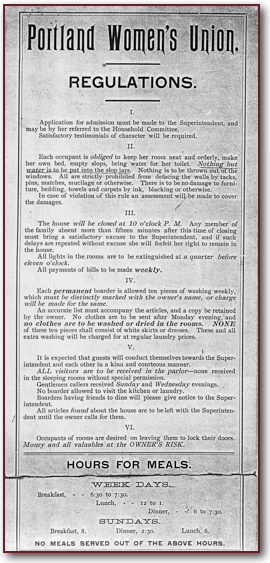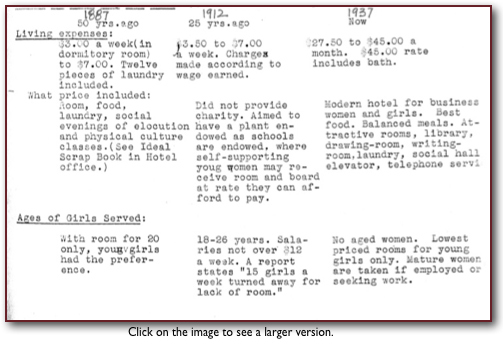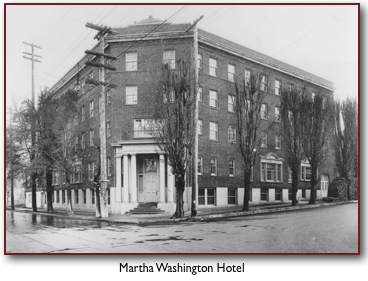Portland Women's Union/Foundation History 1887-2010
 1887 – Founding
1887 – Founding
Portland grew from a single cabin on a muddy riverbank to a fast growing frontier town. The population was predominantly male with an ample supply of saloons among the new buildings.
Some of the women, wives of prominent businessmen, became concerned about the welfare of the young women coming to town to work. They gathered in the Unitarian chapel and formed an organization that they called the “Portland Women’s Union.” The word “union” was borrowed from an Eastern social service agency and caused confusion during the time of organized labor.
Their lofty purpose was stated in their constitution: “. . . in order to forward and uphold the ideals and advancement of American womanhood, to establish a hotel for self-supporting young women, coming strangers to Portland, for a suitable residence, to provide counsel and assistance when necessary, and to minister to their well-being and happiness.”
First Residence Hall
Mrs. Mann donated the first home on Fifth and Flanders called the Anna Lewis Hall. It accommodated twenty young women. They employed a manager and provided laundry and meals. Their goals exceeded protection and physical comfort. The PWU provided the cultural and social benefits of a home; furnishing a library, planning programs and concerts for the residents.
Financial support came from public-spirited citizens - a large membership donated a $1.00 membership fee. They gave annual balls in the Parson’s Hall or Portland Hotel to meet their annual deficit. The floral décor, music and gowns at these events were elegant. In addition, the events received good publicity.
1886 – Portland’s First Night School
PWU started a night school for working women with volunteer teachers offering arithmetic, grammar, penmanship and bookkeeping. It became so popular that young men clamored for admission. Miss Sabin, Public School Superintendent, assumed the management of Portland’s first night school.
 1890 – Residence Hall Expansion
1890 – Residence Hall Expansion
More space was urgently needed at Anna Lewis Hall. Subscriptions raised funding for the $9,000 addition; the Hall now accommodated sixty young women.
To help pay off the mortgage during the depression of 1890, PWU presented a Pardon and Kermis, an evening of grand entertainment, diner and dancing in the old world tradition. Held at the Exposition Building, the event continued for a week and involved 500 participants as dancers and participants. Miss Eager came from New York to choreograph the dances; the dancers wore elaborate costumes. The dances and booth represented various countries. The PWU also offered matinees for children. The events raised $7,000 in total proceeds with a net income of $4,000 for the PWU. The PWU executed this event two times for the community.
1894 – “Traveler’s Aid”
PWU provided a matron at the train depot to assist women arriving in Portland. Later the YWCA assumed the program that became “Traveler’s Aid.”
1898 – Industrial School
PWU started an industrial school to teach sewing, gardening and the rudiments of housekeeping from dishwashing to making a bed. Classes were held at the Children’s Hall on North Seventh. Charges for the classes were fifteen cents a month.
1904 – Women’s Exchange
Concern for a worthy class of women who could not help themselves led the PWU to open a Women’s Exchange. The Exchange began with a table in the Portland Hotel and at the YWCA. It was considered the place to eat and meet your friends. At the Exchange, working women and men and shoppers could enjoy a hot, inexpensive lunch. Preserves and baked goods were for sale as well as beautiful embroidered linens. Later, the Exchange incorporated into a separate organization, relocating to Fourth and Alder and lasting until the start of World War I.
 1905 – The Women’s Restroom
1905 – The Women’s Restroom
PWU made a great contribution to the World’s Fair, furnishing and staffing the Women’s Restroom. This tremendous accomplishment for such a small city must have involved every citizen.
1911-1924 – The Martha Washington Hotel for Women
PWU began planning and raising $10,000 for a new residence hotel at SW Tenth and Montgomery.
The cornerstone was laid on January 29, 1917 in wet falling snow. In the small group that braved the storm were a number of Portland’s best-known women: Mrs. Mann, whose $20,000 purchased the site, Mrs. Burrell, First President, Mrs. Jones, First Vice President, Mrs. Failing, Mrs. Helen Ladd Corbett, and several others who assisted in the organization of the PWU in May of 1887. Mrs. Jones placed a metal box containing the records of the PWU and a few other documents in the stone. A trowel of mortar sealed the box by the President, Mrs. Comstock, thus concluding the ceremonies.
 On October 21, 1917, the Martha Washington Hotel dedication and the 30th anniversary of the PWU were celebrated during a reception in the Hotel’s living room. An annex was built in 1924. Roscoe Hemmingway was the architect of the building and annex.
On October 21, 1917, the Martha Washington Hotel dedication and the 30th anniversary of the PWU were celebrated during a reception in the Hotel’s living room. An annex was built in 1924. Roscoe Hemmingway was the architect of the building and annex.
1969 – The Martha Washington Hotel Moves
The Portland Development Commission purchased the Martha Washington Hotel building and Portland State University used it. The PWU purchased the Campbell Court Hotel at Eleventh and Main, renaming it the Martha Washington hotel for women.
1983 – Hotel sold, Foundation Established
During the 1970’s, the PWU decided that it was not financially feasible to continue operating a hotel for women in Portland. The PWU sold the hotel in January 1983 to the Rajneesh Investment Corporation and used the funds from the sale to establish a charitable foundation called the Portland Women’s Foundation (PWF). PWF retained rights to the name Martha Washington Hotel.
In 1986, the Rajneesh Investment Corporation sold the hotel building to Multnomah County, which used it as a work release center for county offenders. The Rajneesh Corporation paid the PWF Trust the balance of the money’s due to the PWU.
1987 – 100 Years of Service
PWF celebrated one hundred years of service to women in the Portland community. The mission statement for PWF is to oversee the PWF trust fund and to grant financial assistance to agencies in the larger Portland community (Clackamas, Multnomah, Washington counties) that address the needs of women for housing, health, respite and child care while providing these women with the opportunity to achieve self-esteem and self-sufficiency.
2008 – Refocusing Our Mission; Expanding Our Giving
In 2008, PWF narrowed its granting scope to enhance its impact, supporting only community housing and education programs to help women gain safety and security.
From 1984-2008, the Portland Women’s Foundation had contributed over $3 million to local social service agencies. Grants ranged from $1000 to $10,000.
Included in the $3 million total grants was a special technical assistance fund to boost grantees’ knowledge and skill in areas such as strategic planning, board development, financial management and organizational development. In partnership with the Women’s Care Foundation, PWF seeded the fund in 2000; TACS (Technical Assistance for Community Services) administers the monies and provides the expertise and training.
In 2007, PWF awarded its first multi-year grants (2 or 3 years) to select agencies to enhance the work they did.
And in 2010, PWF will award its first special impact grant – a larger amount than regular grants – to an agency to enable it to more effectively target a women’s housing or education issue.
2010 – The Martha Washington Readies For A Makeover
During her lifetime, the Martha Washington Hotel has served as a women’s boarding house, a commune, a county restitution center, and soon will begin a new life in housing low-income women and others in need. Quite a history!
This information came from files at the Oregon Historical Society, with additions from PWF members, including Virginia Rupp Shearer, Ann Pierce, Sally Gram, Hazel Larpentur, Molly Bayless-Shank.